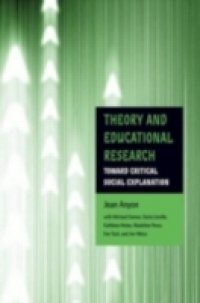Most empirical researchers avoid the use of theory in their studies, providing data but little or no social explanation. Theoreticians, on the other hand, rarely test their ideas with empirical projects. As this groundbreaking volume makes clear, however, neither data nor theory alone is adequate to the task of social explanation-rather they form and inform each other as the inquiry process unfolds. Theory and Educational Research bridges the age-old theory/research divide by demonstrating how researchers can use critical social theory to determine appropriate empirical research strategies, and extend the analytical, critical - and sometimes emancipatory - power of data gathering and interpretation. Each chapter models a theoretically informed empiricism that places the data research yields in constant conversation with theoretical arsenals of powerful concepts. Personal reflections following each chapter chronicle the contributors' trajectories of struggle and triumph utilizing theory and its powers in research. In the end this rich collection teaches education scholars how to deliberately engage with critical social theory in research to produce work that is simultaneously theoretically inspired, politically engaged, and empirically evocative.

